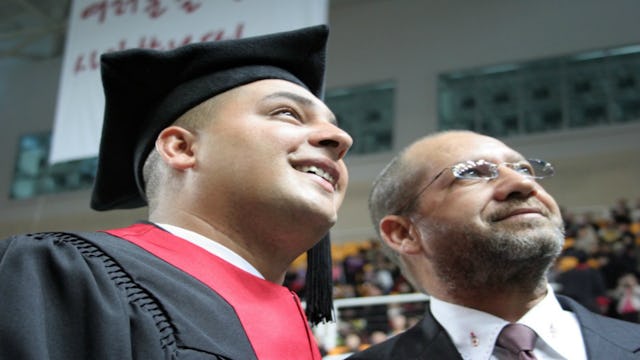Helicopter Parenting Apparently Doesn't End When Kids Go To College

Here we go again, having to talk about the incessant and dangerous hovering of a generation of helicopter parents. Except this time we’re not talking about an anxious and worried mother of a second-grader, demanding to walk her child into the classroom every morning. Nope.
We’ve gone full-throttle bonkers here, because now we’re talking about a ridiculously overprotective and meddling mother of a college freshman (or sophomore, junior, and senior).
We’re talking about a mom demanding that an on-campus official go wake up her daughter for class and ensure that she gets there on time, or an onerous father who phones his son’s professor, and in his best 18-year-old voice, impersonates his son and pleads his case for a failed exam retake.
Yes, folks, welcome to college in 2017 — it’s like daycare, but with keg stands and 3 a.m. greasy pizza delivery.
Apparently, the traditional cutting of the apron strings no longer naturally happen when a child goes off to college. Instead those strings just get longer, albeit stretched to their max, but still 100% attached to both parent and child. It is a phenomenon appearing on today’s college campuses with increasing frequency — an epidemic of parents attempting to micromanage at every level, all of the experiences (as well as the failures) their kids have while going to college.
Recently, an administrator at a liberal college in the northeast (who wanted to remain anonymous because of potential professional concerns) spoke up about this parental hovering trend. “Over the last two or three years, it’s become unbearable,” she said. “I’ve had parents calling up and impersonating their children, asking questions that could have been easily asked by their kids. One lady didn’t even bother to disguise her Long Island soccer-mom voice.”
Parents are treating the college years in the same vane as elementary school, going so far as to attempt to schedule parent-teacher conferences with professors, and at times even calling university presidents to rail about a bad grade, an unfair assignment, or a generally dissatisfied student — as if they are contacting a customer service agent. And when their kid doesn’t answer their phone on the first or second ring? Parents are now frantically contacting campus security and asking for wellness checks if they haven’t heard from their child in just a couple hours.
What is happening, people? Why are today’s modern parents unable to simply “let go” for the sake of their children’s well-being and healthy development?
Experts think it’s the curse of constant connection that has moms and dads happily (and chronically) involved in every aspect of their children’s lives — even the challenging parts, missteps, and failures. And because parental instinct kicks in, parents often run to the rescue.
Harlan Cohen, who wrote the book The Naked Roommate: And 107 Other Issues You Might Run Into in College, contends that technology is often to blame. He states, “The natural divide with teen and adult has been blurred by technology and has enabled teens and parents to stay in contact during the time of transition. It’s a natural inclination for [families] to want to do more.”
I agree wholeheartedly. I often will get a knee-jerk text from my son at college about a problem the second it happens, and of course, I want to instantly get involved. It takes an almost Herculean restraint to resist the urge to swoop in and make things better. I face the tough decision many days to not reply to my son and solve his problem, but rather call him a few days later and ask him how he solved it for himself.
But I recall my college years when, before smartphones and the ability to instantly reach my mother at any time of the day, if I had a problem, I simply had to solve it myself. The alternative was schlepping it around campus looking for a payphone, and worse, having to feel like a “child” who couldn’t handle it herself.
Ironically, our young adults face a different kind of maturation problem — that of forever feeling and acting like a child — even well into adulthood. Unfortunately for both parties, anxious parents who overparent are doing so to the detriment of their college-aged kids, as it almost certainly guarantees a cycle of anxiety and poor coping skills.
Bottom line? According to Cohen, parents need to cut the cord early and often in the teen years. Cohen says the best thing to do is give students a day to figure out their problems on their own. But more importantly, parents need to nurture independence before their kids leave the nest. “The rules are: to get comfortable with the uncomfortable. This needs to start in high school.”
Personally, I think it needs to happen well before high school. Let’s stop doing our kids’ middle school science projects, and rushing into school with their forgotten lunch bag. Parents, can we please let our kids do their own work? Honestly, I’m too tired to try to tackle college statistics class anyway.
This article was originally published on